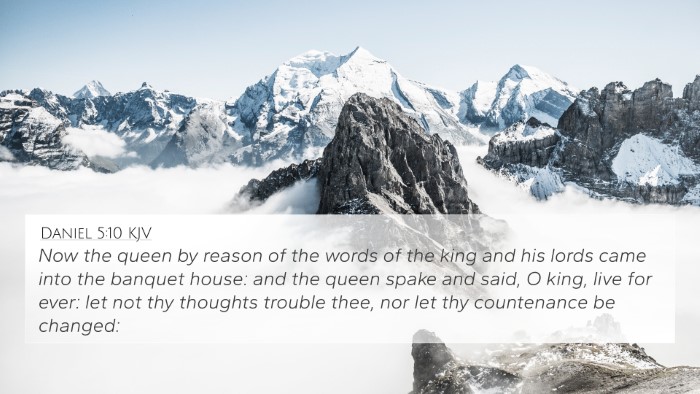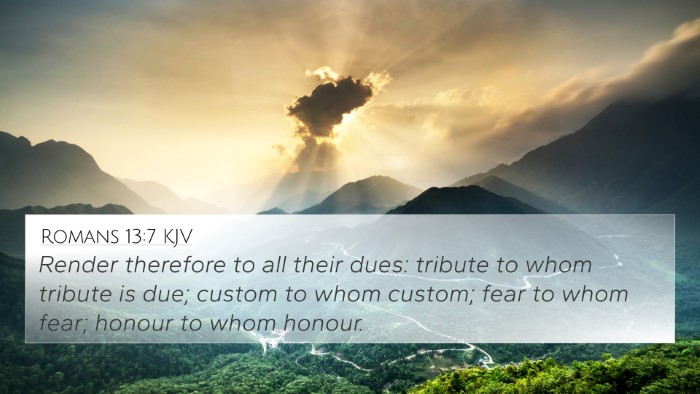Understanding Daniel 3:9
Daniel 3:9: "They spake and said to the king Nebuchadnezzar, O king, live for ever." This verse occurs within the context of the narrative where Shadrach, Meshach, and Abednego are being accused of not worshipping the golden image set up by King Nebuchadnezzar.
Summary of Insights
This Bible verse serves as an introduction to the challenge presented to the faithful Jewish men amidst a direct confrontation with the Babylonian king. Understanding this verse necessitates exploring the underlying themes of loyalty, idolatry, and divine preservation.
Key Themes and Interpretations:
- Loyalty to God: The response of Shadrach, Meshach, and Abednego reflects their unwavering loyalty to God in contrast to the king's expectation of allegiance to man-made idols.
- Idolatry and Resistance: The act of worshipping an idol is a central theme challenged in this verse and throughout the chapter, highlighting the call to resist societal pressures to conform.
- Divine Sovereignty: In addressing Nebuchadnezzar with the phrase "O king, live for ever," the vassals exhibit a recognition of the earthly authority while simultaneously pointing to a higher, divine authority.
Connections to Other Biblical Texts:
- Exodus 20:3-5: The first and second commandments directly oppose the worship of idols.
- Isaiah 43:10: Highlights God's declaration of His servants who worship Him alone.
- Matthew 10:28: A reminder to fear God rather than man, resonating with the stance taken by the faithful men.
- Acts 5:29: The apostles declare, “We ought to obey God rather than men,” paralleling the defiance of Shadrach, Meshach, and Abednego.
- Philippians 2:10: Every knee shall bow to the name of Jesus, connecting to the theme of ultimate worship directed solely towards the true God.
- Revelation 13:15: Discusses the idolatrous nature of end times and worship of the beast.
- Ephesians 6:13: Encouragement to stand firm in the face of spiritual opposition, reflective of the stance taken in Daniel 3.
Further Analysis and Commentary
The response of the accusers in Daniel 3:9 serves multiple purposes in the narrative. The use of flattering language towards Nebuchadnezzar indicates the political maneuvering of the advisors who position themselves against the defiant servants of God. Matthew Henry points out that their approach reflects a desire for favor from the king while seeking to undermine the influence of Shadrach, Meshach, and Abednego.
Albert Barnes emphasizes the importance of recognizing the audacity of the accusation against the three Hebrews and how it was founded on their implicit rejection of the king's decree. This serves as a reminder of the consequences that can arise from holding firm to one's beliefs in a hostile environment.
Adam Clarke notes that the phrase "live for ever" serves as a typical Babylonian salute, reflecting the cultural norms of the time. This interaction underlines the juxtaposition of true faith against a backdrop of cultural idolatry, where the faithful's task is to maintain their spiritual integrity despite the demands placed upon them by a powerful king.
Bible Verse Cross-References
In exploring Daniel 3:9, it’s crucial to observe the thematic connections present in the broader Biblical narrative. Below are highlighted verses that provide deeper insights and parallels:
- Daniel 3:16-18: The responses of the three Hebrews showcase their faithfulness and commitment to God.
- Romans 12:2: Encourages believers to not conform to the patterns of this world, tying into the refusal to worship false idols.
- 1 Peter 2:9: Affirms believers as a chosen race, a royal priesthood, contrasting earthly monarchy with heavenly kingship.
- Luke 16:13: Indicates no servant can serve two masters, reiterating the necessity of allegiance to God over worldly powers.
- Hebrews 11:33-34: Mentions faithful individuals who conquered kingdoms, reinforcing the theme of faith amid trials.
- 2 Timothy 1:12: Reflects the confidence in God’s faithfulness that aligns with the three men’s trust in divine deliverance.
- Revelation 2:10: Provides encouragement to remain faithful unto death, paralleling the stand taken in Daniel chapter 3.
Thematic Bible Verse Connections
Understanding natural connections between these verses can be facilitated through various tools for Bible cross-referencing. Below are suggested methods:
- Bible Concordance: Utilize a Bible concordance to track key terms and themes throughout scripture, aiding in identifying relevant cross-references.
- Cross-Reference Bible Study: Engage in studies that link verses based on thematic continuity, allowing for richer understanding and context.
- Bible Reference Resources: Consider using tools that offer insights into verse relationships and thematic connections, enhancing Bible verse parallels.
Conclusion
Daniel 3:9 serves as a pivotal moment in illustrating the conflict between civil authority and divine command. The implications of this verse resonate throughout scripture, linking it to broader themes of faithfulness, obedience, and the ultimate sovereignty of God over all earthly powers. As believers study these connections through cross-referencing Bible verses, they can gain greater clarity on the enduring teachings found within God’s word.








